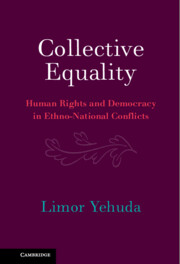1 - Introduction
Published online by Cambridge University Press: 20 April 2023
Summary
The advantages of power-sharing arrangements as a tool of peacemaking are gradually being substantiated in practice and research, but have not yet gained normative legitimacy, nor have they been properly incorporated into either the human rights framework or international and regional law. When power-sharing arrangements utilize predefined ethno-national groups as a central feature of the constitutional structure, they are widely seen as illiberal (and unjust) and as violating individual rights to equality and nondiscrimination. This conflict between power-sharing and human rights is generally viewed as a dilemma between peace and justice, and the main justification given to support the maintenance of the arrangements is that they are an indispensable political compromise to overcome violent conflict and are preferable to the continuation of bloodshed. However, this justification is not always enough, as the European Court of Human Rights ruling in the case of Bosnia and Herzegovina’s constitution illustrates. But is this “peace versus justice” framing of the tensions between power-sharing and human rights accurate? Does it properly account for the meaning and requirements of justice in loci of deeply divided places?
Keywords
- Type
- Chapter
- Information
- Collective EqualityHuman Rights and Democracy in Ethno-National Conflicts, pp. 1 - 40Publisher: Cambridge University PressPrint publication year: 2023



